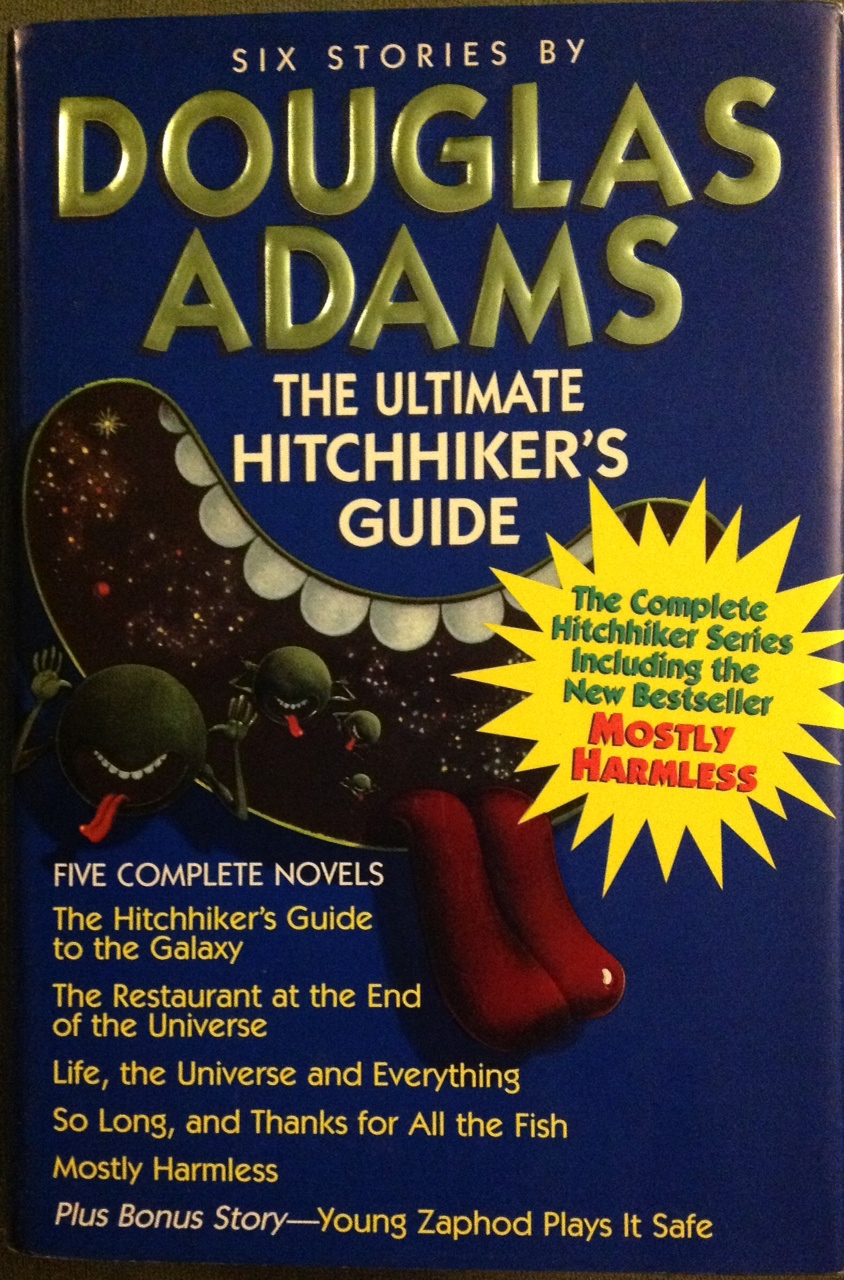 |
The Ultimate Hitchhiker's Guide
Author: Douglas Adams
Publisher: Random House
ISBN: 0-517-14925-7 |
This particular series is an interesting one. Except for one short story, it follows the life of Earth human being Arthur Dent, and his adventures through space and time. I started reading the series kind of on a whim, and took a break after two or three books to read Marley and Me, just so I could keep myself placed in reality.
The series has sort of a Star Wars feel to it, but with quirky British humor. I found that the first book was the easiest to read because it was the only book in the series that was made into a movie. After reading through probably either the fourth novel, or the included short story, I watched the movie again, and in comparison with the book, there were only two deleted scenes on the DVD copy that I had. Now normally this would probably seem like a big deal, but after watching the scenes in question, I thought back to the book itself and reached the conclusion the the omitted footage in question was eliminated for time constraints, and wasn't immediately relevant to the plot overall.
The Hitchhiker's Guide to the Galaxy (book one) introduces most of the major characters in the series, and shows how they all meet. It also tells the story of the destruction and reconstruction of Earth, as well as where humans "fit in" in the grand scheme of the universe.
The Restaurant at the End of the Universe (book two) picks up right where the first one ends. All of the main characters go to the Restaurant at the end of the Universe, for a bite to eat. However, the thing that the first book fails to mention is that "end" doesn't refer to a particular destination, but instead a point in time, as in "The universe will end when dinner is over." There is also some grand theft auto described, where one of the main characters, whom literally has a split personality, decides to steal a different spacecraft other than the one he flew in on, which was also presumably stolen. This book also talks about the corporate offices of 'The Hitchhiker's Guide to the Galaxy,' which is supposed to be the "book within the book," although due to its size, all of the volumes are stored on a folding tablet-like device.
Life, the Universe and Everything (book three) brings us to a planet known as 'Krikkit,' which, in essence, is an Earth-like planet that is stuck in the caveman era. It also tells of a creature that has nine lives and is reincarnated each time Arthur visits a different era, where he unintentionally destroys one of the creature's lives.
So Long and Thanks for All the Fish (book four) is about a girl that goes by 'Fenchurch,' whom Arthur Dent pursues a relationship with. Along these lines as the story progresses, we find that Arthur Dent finally makes his way back to Earth and supposedly the girl is crazy, because we meet her brother, Russell, who is a cab driver, and also happens to be the one who tries to take her back to the insane asylum.
Young Zaphod Plays it Safe is a single-chapter short story that follows Zaphod Beeblebrox (the guy with two faces) during his days of working for a salvage company (think 'Sanford and Son,' but set in space). The weird angle of this particular part of the volume is that "safe" is completely out of character for him, especially if you read the other stories in the volume. As I was reading it, my initial thought was "Wow. Pixar should have picked up the rights to this one and made a cartoon out of it."
Mostly Harmless (book five) brings us back to the life of Arthur Dent, only this time he is stranded on an alternate Earth in a different galaxy where he is a legendary "sandwich maker" for the planet. The book also has a chapter of back story to go with this arc and it is quite hilarious. Like the other books, it doesn't make a lot of sense, but it is still hilarious none the less. It also wraps up on the same planet, however, and even though I was glad to be done with it by the time I reached the final page, I was also slightly let down because I felt that it sort of just dropped off on the foreign Earth without resolving too much.
All in all, if your sense of humor is as warped as mine is, this book is definitely worth a read. However, based on personal experience, I highly recommend taking a break between books three and four in order to save sanity and live in reality a little. (I actually read Marley and Me during that break--review later).

